Joel Coen and Ethan Coen’s (the Coen brothers) No Country For Old Men film stands as one of the most thrilling films of all time. The film has also given one of the most chilling villains of all time. The cat and mouse chase that we see in the entire film is all about (no wonder) money – a bag full of stolen drug money. Llewlyn Moss and Anton Chigurh are the most important characters in the film, though it is difficult to tell the hero-villain distinction here, while Sheriff Tom Bell is the one that makes the audience mark the increase in violence over time with his observations.
“All the time you spend trying to get back what’s been taken from you, more is going out the back door.”
No Country For Old Men is based on a 2005 novel written by American author Cormac McCarthy. The No Country For Old Men film review film was released in 2007 and has bagged four Academy Awards including Best Picture. Known as a neo-Western crime thriller, the film has also won other awards like the three British Academy Film Awards, two Golden Globes, was listed as the movie of the year by the American Film Institute and was selected as the best of 2007 by the National Board of Review.
The plot of No Country for Old Men might be about the chase for money, but the entire story is much more than that – it is about the wretched human morals in a land where the dominance of violence is ever-increasing. In this No Country For Old Men film review, we are going to see the human morals on their edge and the tossing game of fate and self-determination while also noting a few points on ‘Show, don’t tell’ concept of filmmaking that No Country For Old Men uses so well.
The Tale of Terrell County
“Some of the old-time Sheriffs never even wore a gun. A lotta folks find that hard to believe.”
It is the year of 1980 in Terrell County in Texas where a hitman Anton Chigurh has just strangled the deputy sheriff and is on the loose once again towards his mission of recovering a bag full of drug money. Anton Chigurh’s weapon is an air-powered bolt pistol that penetrates through whatever it is aimed at, giving a look of a gunshot but leaving no bullets or bullet shells.
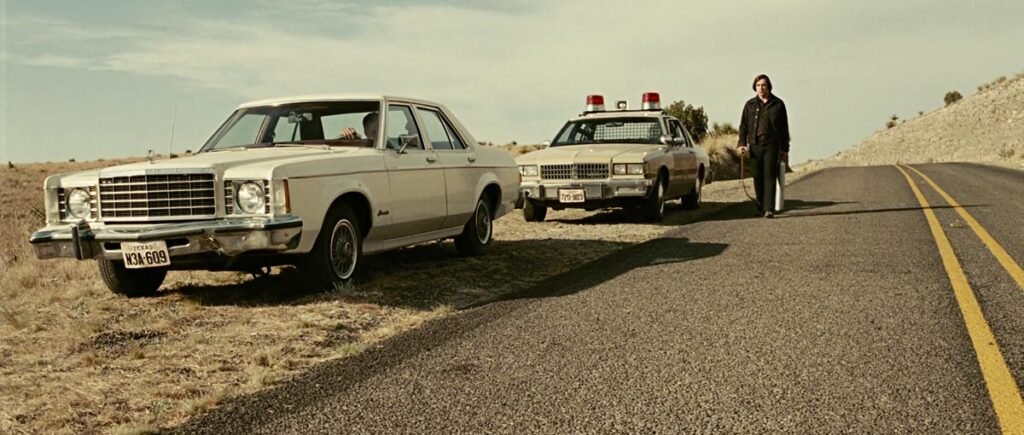
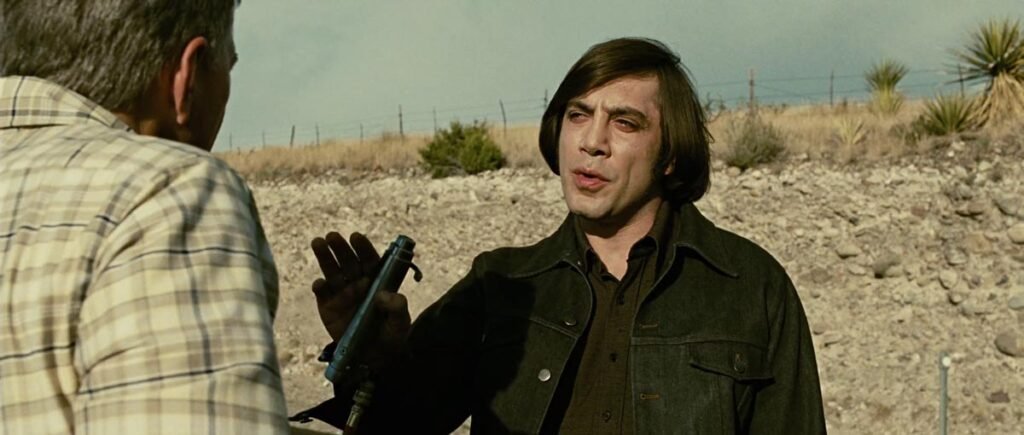
On the other hand, Llewlyn Moss, another resident of the same area, is introduced as a pronghorn hunter. One evening during his hunting, he comes across what looks like a shoot-out with corpses of humans and dogs loitering the place. At some distance, he finds another dead man with a bag stacked with money, and thus begins the chase.
Moss escapes with the bag of money, sends his wife to her mother’s place, and seeks shelter in a motel. Little does he know that the stack of money has a tracking device tucked between the notes and that Anton Chigurh, the cold-blooded hitman, has already traced him down.
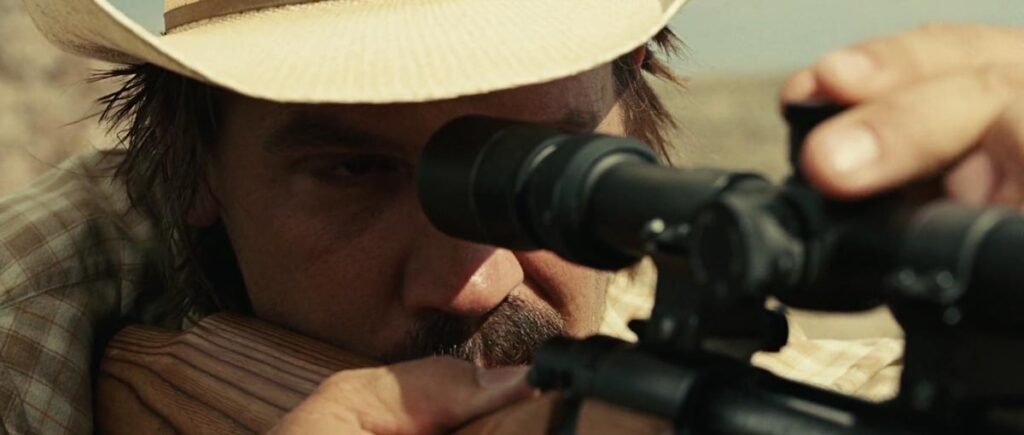
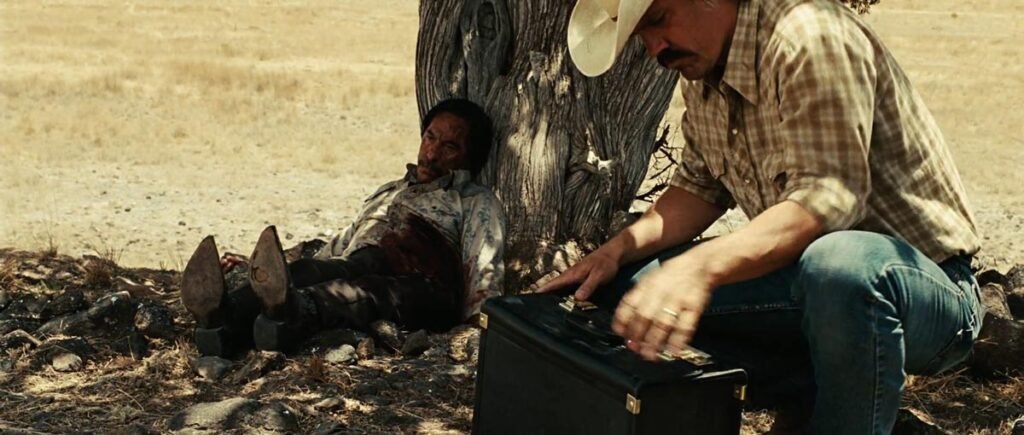
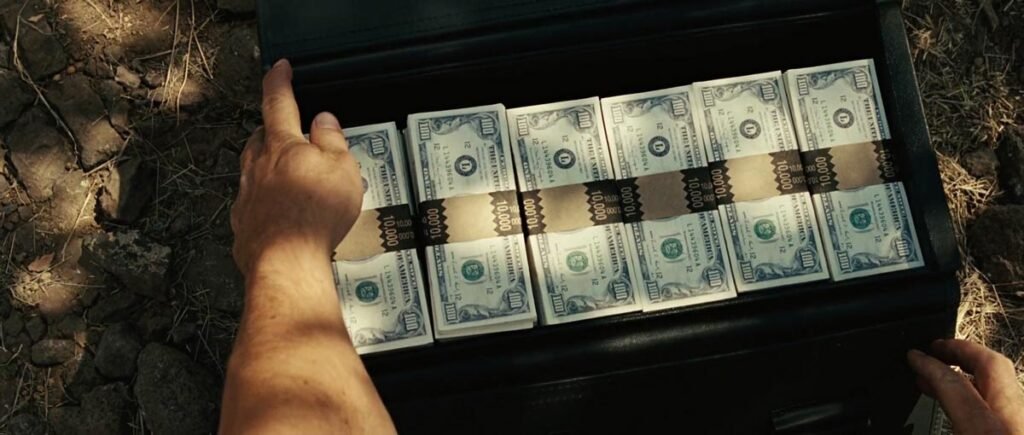
Amidst all this, Sheriff Tom Bell, a reputed sheriff of the area, is investigating the dozen corpses case. He is an old man who’s about to be retiring and vents his concerns regarding the ever-worsening situation of the country. All the violence, murders, and theft are beyond his comprehension. In the end, he sits with his wife and talks about his two dreams, both of which represent his failure and his recalling of the time when the world was a better place than what it is presently.
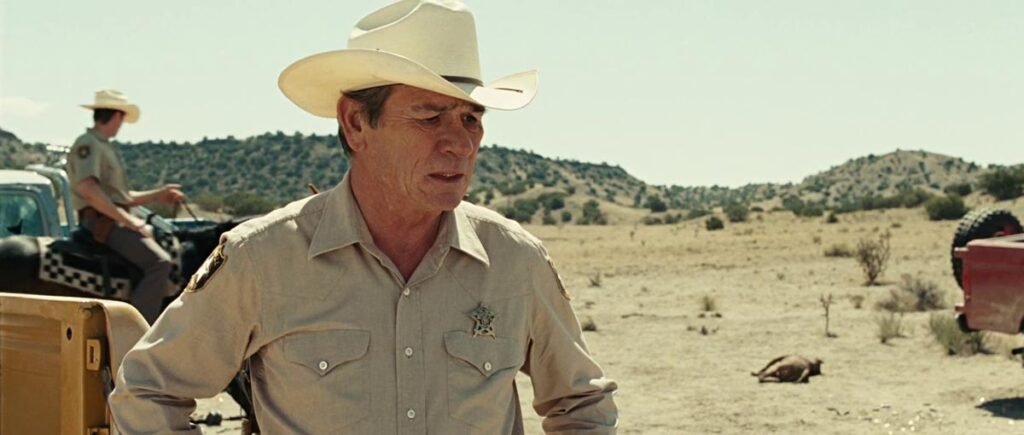
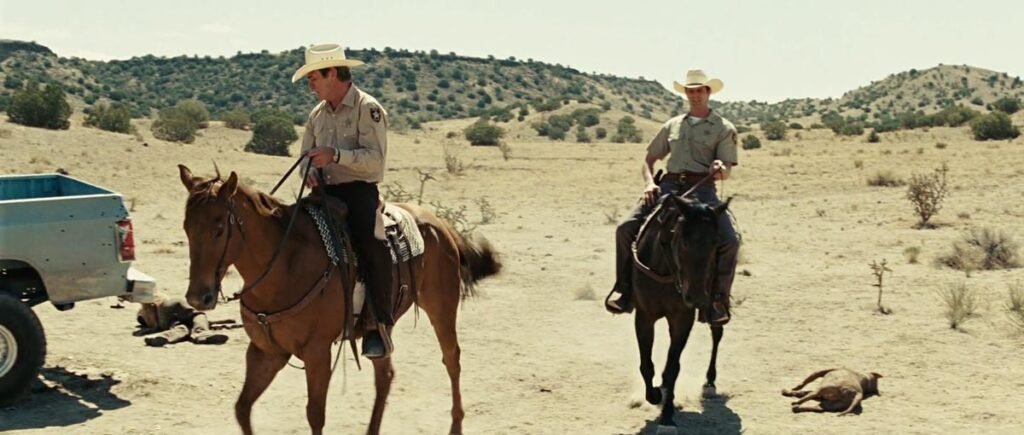
Hero Or Villain
At the beginning of No Country For Old Men, Sheriff Tom Bell recounts that when his father was the sheriff, they didn’t even need to carry guns. And that now things are only moving towards the worst. Violence, just like it dominates the region, is the main dominating factor of the film as well. Anton Chigurh’s first appearance in the No Country For Old Men film is while getting arrested, and Moss’s first appearance in the film is while hunting – both suggesting that the two are not too far away from violence.
The world has become grey; the good cannot be told apart from the bad. At some point, Moss might appear to be the protagonist and Chigurh to be the antagonist. However, Moss is trying to escape with a bag of stolen money and hence, is not of a high moral. Unlike in traditional narratives where the hero defeats the villain, Moss dies and Chigurh escapes with the money. Thus, the hero and villain line of distinction is blurred.
“The crime you see now, it’s hard to even take its measure.”
It is also unclear to say that the story is told through which of the three characters’ perspectives, Chigurh, Moss, or Bell’s. While the cat and mouse chase goes on between Chigurh and Moss, either overtaking the other one time and escaping by an inch another time, Bell stays on the sideline and tries to do justice to both of them and his country and is left with a pang of guilt and a wish to undo a lot of things.
A Toss Of Fate
“This is the best deal you’re going to get. I won’t tell you that you can save yourself because you can’t.”
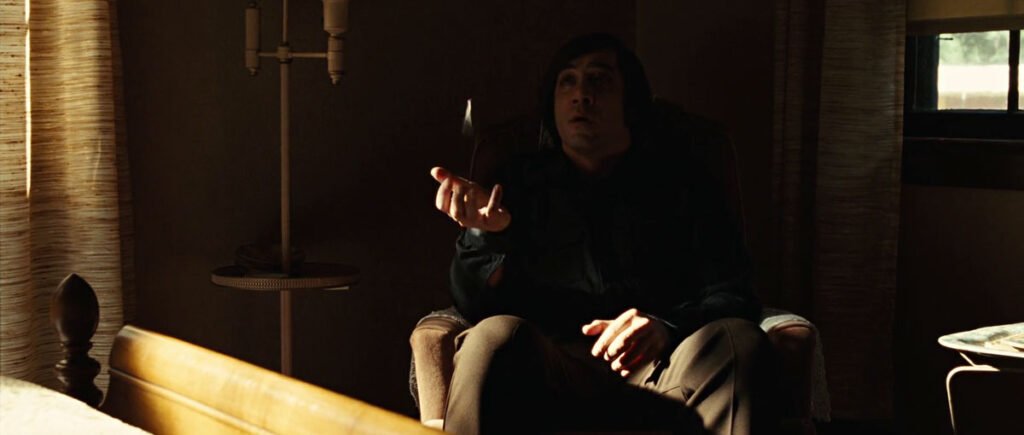
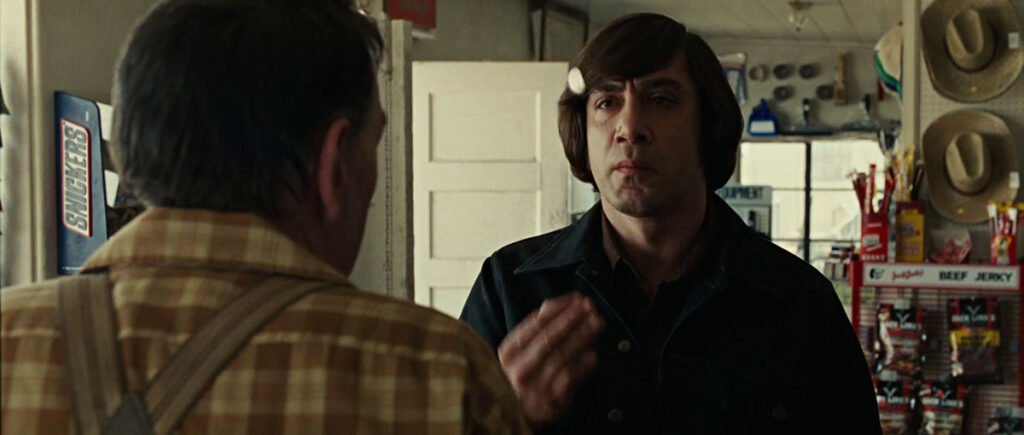
One of the themes of No Country For Old Men is overtaking the inevitable fate or death. Anton Chigurh is a strange man who, unflinchingly, kills people losing a game of coin toss. He calls it fate. Carla Jean returns from her mother’s funeral in the isolated house to find Anton Chigurh waiting for her. He gives her a chance to make a call between heads or tails, refusing which, she gives Chigurh the authority to decide her fate and gets killed. This makes me wonder, had the innocent and unaware owner of the gas station made a wrong call of head and tails, could have got him killed?
Anton Chigurh decides the fate of the man whose car he later stole. He kills people, without even wincing once, and that too for no specific reason. He also takes command over his fate, he operates himself and takes the bullet out. Anton escapes with the money in the end even though his bone sticks out of his arm.
Show, Don’t Tell
No Country For Old Men has minimal dialogues which makes it a great example of ‘Show, don’t tell’ concept of filmmaking. The Coen brothers have used the mise-en-scene and the juxtaposition of shots to explain a lot of things without making much noise of it. There are no warnings in words but the makers of the film have used light and shadow as signs of warning instead.
In the scene where Carla Jean is killed, the audience doesn’t see Anton Chigurh actually pulling his gun out and shooting at her but we know what happened. Inside the house, Carla is panicking and screaming knowing that she is in grave danger. In the following scene, we are outside of her house which is extremely silent. Then, we see Anton Chigurh leaving the house as if it is his own and walking away even without shutting the door properly. The sharp cut between the dark indoors where a woman is screaming and the peaceful outdoors tells that she has been killed.
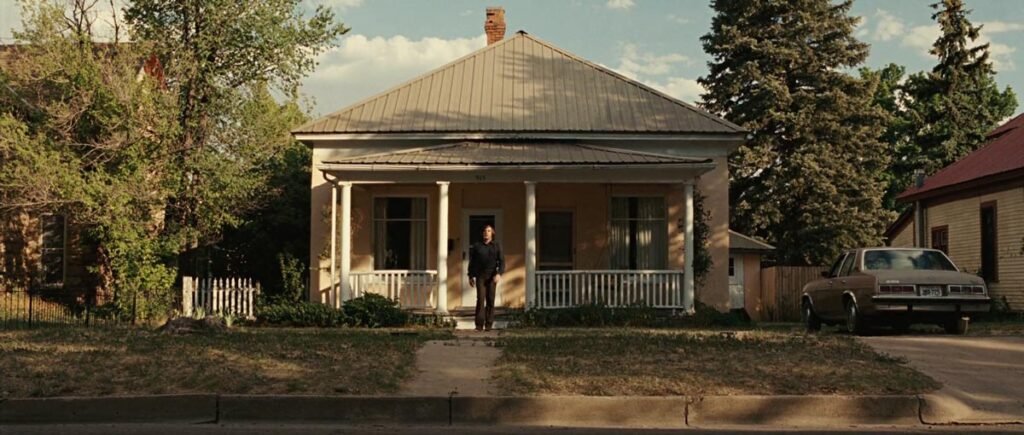
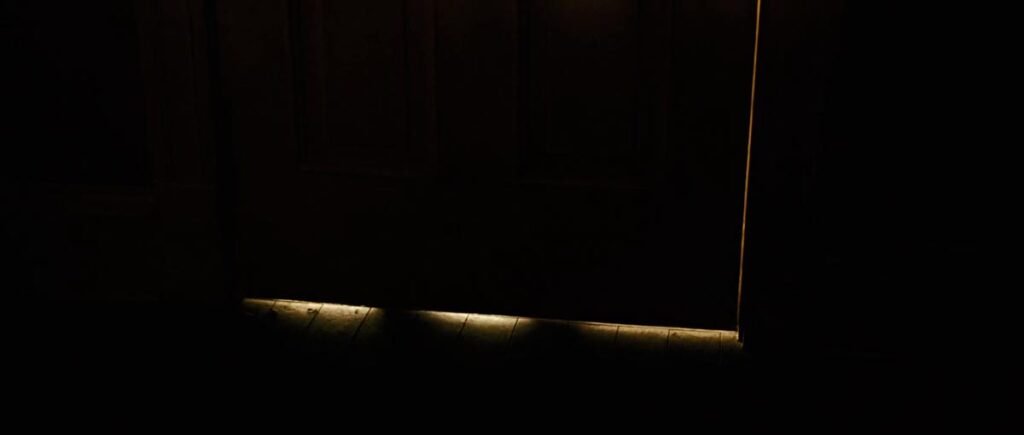
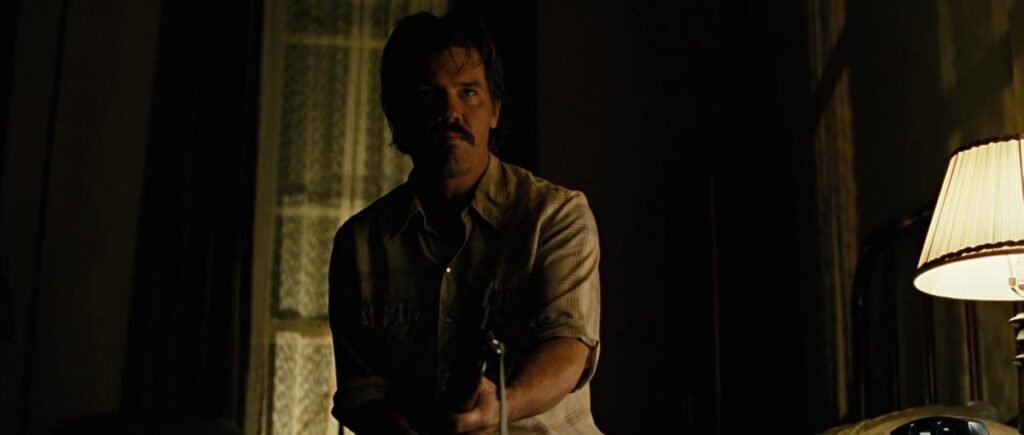
Watching a film with minimal dialogues and a tight screenplay makes the audience focus on the very minute details on screen and sense the inevitable. In the scene where Moss is hiding inside the motel room and Chigurh has traced him, the quick game of light and shadow creates panic among the audience. Moss is inside the room ready with his gun and through the gap between the door and floor, he sees the shadow of Chigurh and immediately knows it’s him. Chigurh, on the other hand, also knows that Moss is inside and is watching him through the shadows and so he goes ahead and switches the light off. In my opinion, it is the scariest scene of the No Country For Old Men film because the audience, too, can sense Moss’s death approaching him.
Besides, the No Country For Old Men film is divided into two extreme lightings. It is either the bright day with a scorching sun over the vast landscapes or the dingy, barely lit, and cramped up houses of the characters where the only source of light is a dimly lit bulb or the filtered sun rays flooding through the curtains – whether it is Moss’s house, Carla’s, or the motel rooms. The shadows are deep and the corners of these spaces are dark.
Bell’s Perspective
The name No Country For Old Men is taken from the twentieth-century Irish poet William Butler Yeats’s poem called Sailing To Byzantium in which the poet says that his country is no longer his. There’s everything for the young but the old is nothing more than a paltry thing or a scarecrow. In the No Country For Old Men film, Bell also finds that the world has gone from bad to worse and continues to be that way. All the violence and murders around him are nonsensical to him.
He tells his wife about his two dreams while contemplating his journey and the journey of the entire country. His first dream was about his father entrusting him with money which he lost. Bell has promised Carla Jean that he would protect Moss if she helps him but eventually fails to protect both Moss and Carla.
In his second dream, a twenty-year-old Bell is following his father who is carrying fire in the darkness. Both are riding on horseback over a snowy mountain. Bell then wakes up. Old Bell is reminiscent of the past and yearns to go back to those times when the world was clearly in black and white – the good and the bad were well-defined.
His dreams are a representation of his guilt of failing to save Moss and his desire to return to the early days. They also imply that the world is not for him because things have moved way ahead of him while he has remained rooted in his past. This again means that the country or the world as a whole is not for old men.
“I always figured when I got older, God would sorta come into my life somehow. And he didn’t. I don’t blame him. If I was him I would have the same opinion of me that he does.”

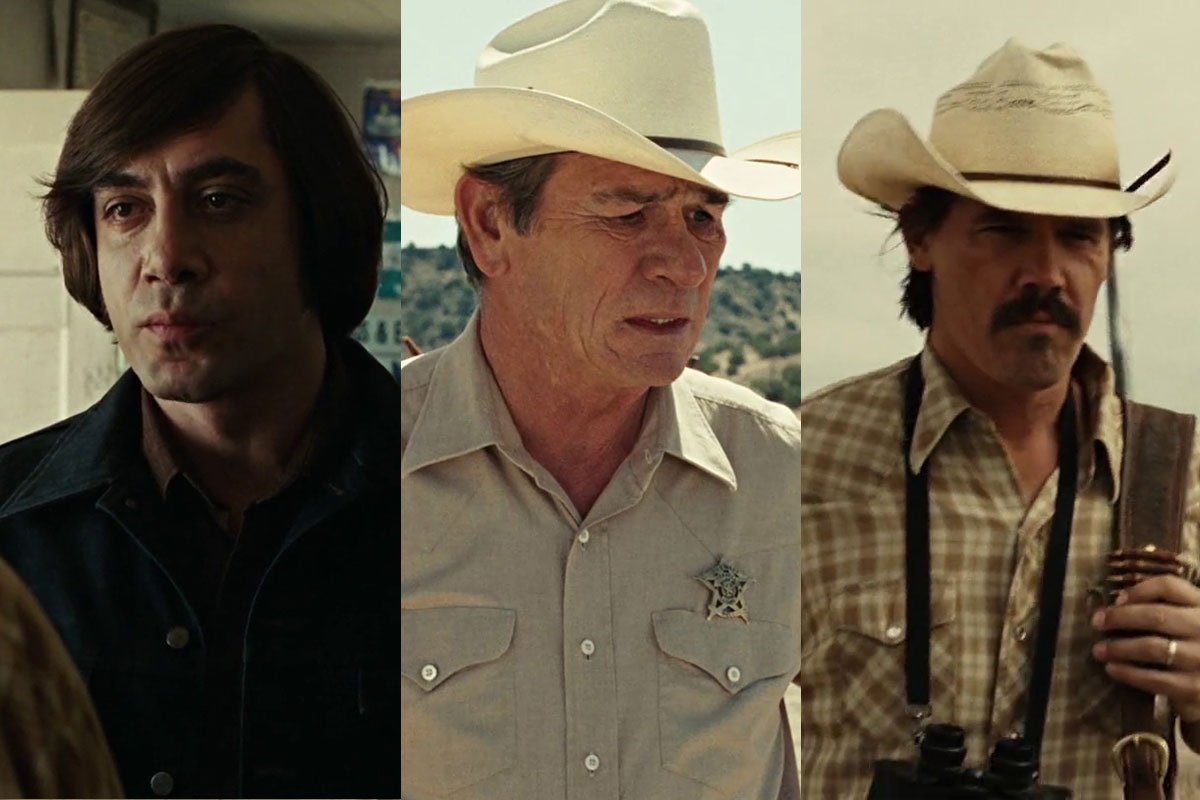

Amazing,
Amazing,